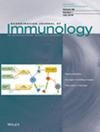Unveiling the intricacies of COVID-19: Autoimmunity, multi-organ manifestations and the role of autoantibodies
IF 4.1
4区 医学
Q2 IMMUNOLOGY
引用次数: 0
Abstract
COVID-19 is a severe infectious disease caused by a SARS-CoV-2 infection. It has caused a global pandemic and can lead to acute respiratory distress syndrome (ARDS). Beyond the respiratory system, the disease manifests in multiple organs, producing a spectrum of clinical symptoms. A pivotal factor in the disease's progression is autoimmunity, which intensifies its severity and contributes to multi-organ injuries. The intricate interaction between the virus' spike protein and human proteins may engender the generation of autoreactive antibodies through molecular mimicry. This can further convolute the immune response, with the potential to escalate into overt autoimmunity. There is also emerging evidence to suggest that COVID-19 vaccinations might elicit analogous autoimmune responses. Advanced technologies have pinpointed self-reactive antibodies that target diverse organs or immune-modulatory proteins. The interplay between autoantibody levels and multi-organ manifestations underscores the importance of regular monitoring of serum antibodies and proinflammatory markers. A combination of immunosuppressive treatments and antiviral therapy is crucial for managing COVID-19-associated autoimmune diseases. The review will focus on the generation of autoantibodies in the context of COVID-19 and their impact on organ health.

揭开 COVID-19 的神秘面纱:自身免疫、多器官表现和自身抗体的作用
COVID-19 是一种由 SARS-CoV-2 感染引起的严重传染病。它已在全球范围内引起大流行,并可导致急性呼吸窘迫综合征(ARDS)。除呼吸系统外,该疾病还表现为多个器官,产生一系列临床症状。自身免疫是疾病发展的一个关键因素,它加剧了疾病的严重性,并导致多器官损伤。病毒的尖峰蛋白与人类蛋白质之间错综复杂的相互作用可能会通过分子模拟产生自体反应性抗体。这可能会进一步干扰免疫反应,并有可能升级为明显的自身免疫。还有新的证据表明,接种 COVID-19 疫苗可能会引起类似的自身免疫反应。先进的技术已经确定了针对不同器官或免疫调节蛋白的自身反应性抗体。自身抗体水平与多器官表现之间的相互作用强调了定期监测血清抗体和促炎标志物的重要性。免疫抑制治疗和抗病毒治疗相结合对于控制 COVID-19 相关自身免疫性疾病至关重要。本综述将重点讨论 COVID-19 引起的自身抗体的产生及其对器官健康的影响。
本文章由计算机程序翻译,如有差异,请以英文原文为准。
求助全文
约1分钟内获得全文
求助全文
来源期刊
CiteScore
7.70
自引率
5.40%
发文量
109
审稿时长
1 months
期刊介绍:
This peer-reviewed international journal publishes original articles and reviews on all aspects of basic, translational and clinical immunology. The journal aims to provide high quality service to authors, and high quality articles for readers.
The journal accepts for publication material from investigators all over the world, which makes a significant contribution to basic, translational and clinical immunology.

 求助内容:
求助内容: 应助结果提醒方式:
应助结果提醒方式:


